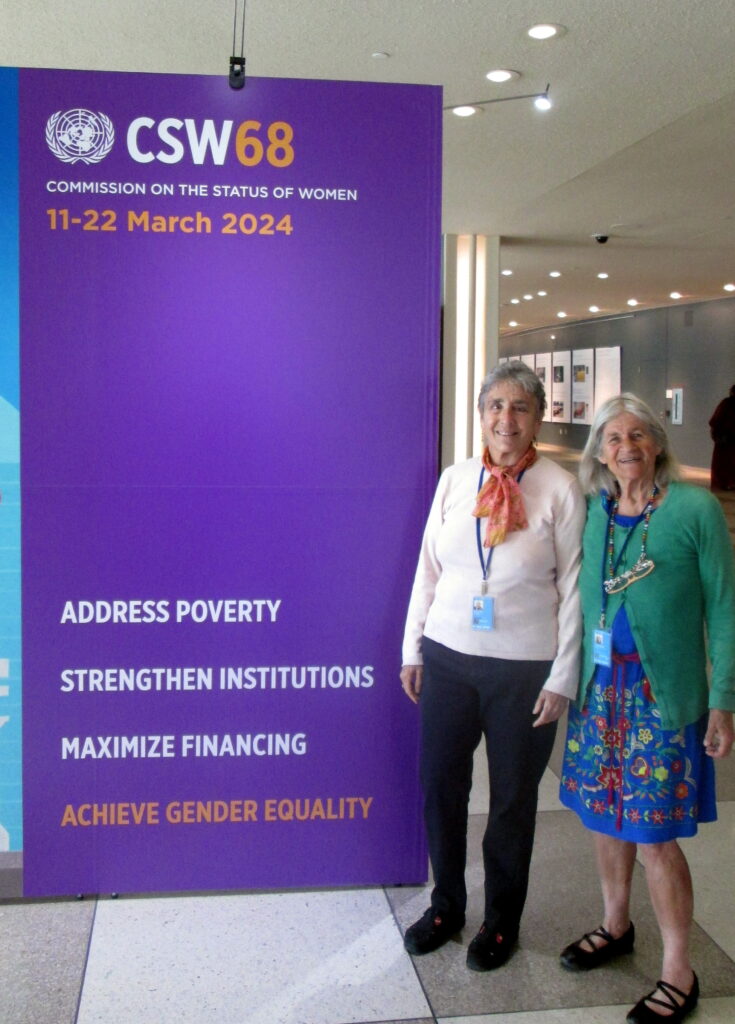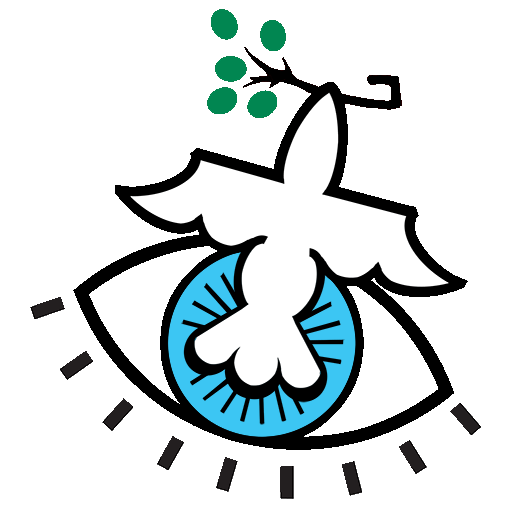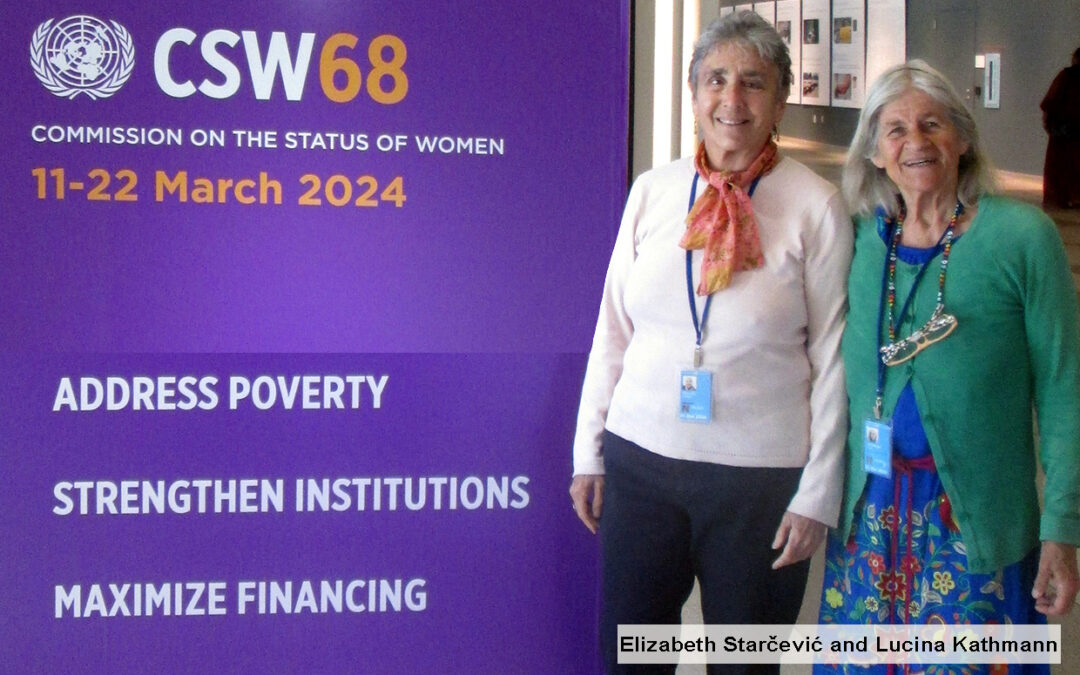It is always exciting and stimulating to attend the meetings of the Commission on the Status of Women at the United Nations which take place during two weeks in March.
It is a visual delight to see so many women in beautiful national garb with colorful fabrics and designs! They walk proudly and joyously and occupy the assembly halls and meeting rooms with an energy and seriousness that is wonderful! Their determination and confidence is uplifting and contagious.
We are there from so many countries and organizations to hear how things are going for women throughout the world and to demand a voice in how resources are distributed and used. Lucina Kathmann and I attend a variety of sessions as representatives of PEN International.
The persistent thread was of women losing ground but also the exhortations to PUSH BACK on this push back. So there were multiple discussions “addressing poverty and strengthening institutions and financing with a gender perspective”, the priority theme for this UN session.
As a former language teacher, I am always interested in the language that is used. Lots of initials- CSW (Comm. on the Status of Women), GBV (Gender Based Violence) SG (Secretary General) NGO(Non-Governmental Organization). There are phrases like -strategic stakeholders, multi-sectoral, intersectional approaches or the description of new social issues. The situation for widows has been raised in the past. Usually they are older women, poor, isolated and mistreated by their families. Recent wars and climate crises have made widows of young women, often with children, thus producing other kinds of social poverty. The topics are the same as before yet different. And yes, things have changed. Yet as we heard about the report that was being written during these sessions, we learned that one part of the push back was to exclude “gender inclusive” language and to use only the words “man and woman” as categories. To fight for a better world for women means addressing the ongoing topics of: war, displacement, rape, poverty, health, access to education, healthcare, attitudes on gender, unpaid care and domestic work, ownership of property, climate change and the social reality of women’s lives. There must be new strategies for change expressed in languages that are open to social/political change.
I attended talks by official governmental representatives from: Africa, Indonesia, Bangladesh, Asia/Pacific, Australia, Pakistan, Mexico, Guatemala, Argentina, Feminist Foreign Policy Group, Brazil, Chile, Sweden, Norway, United States, China and as well as by civil society organizations such as universities, religious groups, areas of finance, and business and many more. It is stimulating and demanding and there is so much more than we can possibly attend. Yet the seriousness that we share in the goal of improving women’s lives carries us to the next panel, the next session.
 How are social programs financed? Is there equity in budgets at all levels? Are funds equally allocated at global, national, state/regional and local levels? Data must be accessible, transparent and shared by all. This topic of transparency and equity in budgeting was discussed in many, many panels. Important statistics were shared on how debt levels and the need to finance the servicing of debt strongly “crowds (sic) out critical investments in public services” of all kinds. Servicing debt takes a hugh toll on budgets. In the US the investment in arms for war has diminished the funding available for social needs -be they roads, hospitals, funds for daycare etc. Oxfam told us that 81 billionaires hold more wealth than 51% of the world’s finances. Women’s systematic exclusion from the investment in human development hurts everyone. There was much more awareness in the panels of the need for all sectors of women to be actively involved in budgeting discussions and that parity requires monitoring by women at every level of society. There was discussion of micro lending and funding from the UN. There was a call for a human rights-based approach to the economy.
How are social programs financed? Is there equity in budgets at all levels? Are funds equally allocated at global, national, state/regional and local levels? Data must be accessible, transparent and shared by all. This topic of transparency and equity in budgeting was discussed in many, many panels. Important statistics were shared on how debt levels and the need to finance the servicing of debt strongly “crowds (sic) out critical investments in public services” of all kinds. Servicing debt takes a hugh toll on budgets. In the US the investment in arms for war has diminished the funding available for social needs -be they roads, hospitals, funds for daycare etc. Oxfam told us that 81 billionaires hold more wealth than 51% of the world’s finances. Women’s systematic exclusion from the investment in human development hurts everyone. There was much more awareness in the panels of the need for all sectors of women to be actively involved in budgeting discussions and that parity requires monitoring by women at every level of society. There was discussion of micro lending and funding from the UN. There was a call for a human rights-based approach to the economy.
One statistic on education for girls said that it will not be until 2050 that all girls are in primary education. War, kidnapping of girls, days lost because of lack of menstrual materials, inaccessibility or poor conditions of schools, social/political stances that prohibit education for women highlight the expansion of poverty for women. We were asked to remember that many adult women and disabled girls have also missed out on education. Indigenous women, in requesting direct funding for their work, pointed to their knowledge of caring for the earth against climate damage and that this benefits all people.
The discussion of the persistent digital divide pointed to STEM courses as providing girls and women better economic opportunities. However, many teachers are not being well prepared, and girls and women are being left behind in digital technology. Online education has provided a life- line of access but millions of women do not have a cell phone or if they have one, have no access to internet. Secretary General A. Guterres gave an example of how bias and inequality in gender and race are already built into the algorithms of the new AI. Cyberbullying, and violent hate attacks on line are dreadfully familiar issues for PEN and for journalists and writers everywhere as part of the expanded use of technology. Guterres prioritized a new agenda for peace and security, for closing the digital divide and the financial gap for all women, with reference to unpaid labor. He responded to questions on the incarceration of women and girls. Care as unpaid work and its link to poverty was addressed in many panels. Care must be seen as a human right.
As the world is experiencing more war and displacement, the UN has included women in the role of global peacekeepers. This has, in some instances, improved situations in crisis. Efforts to protect journalists in crisis areas, particularly rural ones, were discussed. The Colombian mission reported on the project “Mi historia” which gives funds to local radio stations and gives demobilized youth the opportunity to talk about their experiences in war. They highlighted the need to focus on “peace” journalism and to discuss women’s human, economic and social rights in an accurate and gender sensitive fashion. This is certainly a discussion for PEN to contribute to.
There was a beautiful set of photographic panels on healthcare that included discussions on abortion as part of the general state of women’s health and economic needs. That was real progress, as the topic, while discussed in off-site panels, had not be taken up in such a visible way at the formal sessions. It was wonderful to see!
But back to pushback. Today on the front page of the NY Times (3/19/24) is an article about Gambia’s Parliament moving to return to female genital mutilation. It had been banned there. We cannot go backward! There is much work to be done. Adelante mujeres.
Elizabeth Starčević
President Emerita
San Miguel PEN, Mexico

